|
|
Cuisine of North India
.............................................................................................................................................................................. |
|
|
|
North India Tours organize
cooking classes for our individual and foreign
guests. There is a minimum six day course which
can be taken individually as well as in a group if
you intend to bring some more people with you.
During these classes your will be taught to cook
different Indian dishes with the appropriate use
of typical Indian spices and how they are used
normally in an Indian Kitchen. You will be having
a female Professional Indian cook who has many
years of cooking experience. Indian Cookery
Classes will take place at her private cooking
school.
During the classes we recommend you to stay with
an Indian family to experience the real Indian
culture and way of living. We can offer you the
accommodation with an Indian family with private
room in excellent condition in good location with
green surrounding with private bath and WC, cold
and hot water, all three meals |
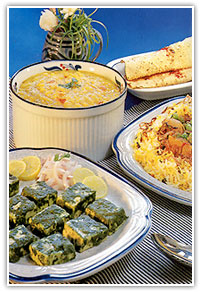 |
|
|
(veg.), Laundry, use of Internet etc.
Currently we are offering Indian cookery classes in
Jaipur, the capital city of Rajasthan (270 kms from
Delhi). Should you be interested we recommend you to
make the bookings well in advance to avoid the
accommodation problem.
Medicinal value of Indian Spices
It is quite interesting to note that most of the Indian
spices have a medicinal value. The most commonly used
spices and herbs in Indian cooking are asafoetida,
cardamom, clove, cinnamon, coriander, garlic, ginger,
turmeric and aniseed. Turmeric, Ginger and Cardamom are
the most commonly used herbs as they have digestive
properties. Turmeric gives the dish a pleasant yellow
natural colour and helps to preserve the food. Coriander
seeds are supposed to have a cooling effect on the body
of a person. Saffron, the most expensive spice, creates
a nice flavour and fragrance with just a little
quantity. Mustard, cinnamon, nutmeg, pepper, cloves,
poppy and caraway seeds are some other spices used in
Indian dishes. In India, Masala is commonly used which
is a blend of various spices and it is either in a dry
or a liquid paste. Garam Masala is a blend of fragrant
spices which include cinnamon, cloves, cumin seeds,
mace, coriander seeds, nutmeg, and black pepper. It can
stored and kept for future use. Nowadays, Garam Masalas
are conveniently available in packets in any grocery.
Indian dishes known as curries
Indian cuisine has a lot of variety to offer. Indian
food can be broadly divided into four different regions
corresponding to Delhi for the North, Bombay for the
West, Madras for the South and Calcutta for the East.
Many varieties of curry-dishes are made in different
parts of India, each of which has its own distinct
flavour. For the Indians, curry encompasses a whole
class of dishes. There are numerous curries which are
prepared with meat, fish, chicken, vegetables and on
occasions, fruits. The only common factor in all the
curries is that they all contain freshly ground spices,
including turmeric, and have a ‘gravy’. The Cooking
medium is is pure ghee (clarified butter). Other
vegetable fats are now more commonly used as the cooking
medium.
Besides the preparation, its presentation of food is
also important to Indians. Traditionally, Indian food is
served either on a well washed large banana leaf or in a
thali which is a large plate made of brass, steel or
silver. Porcelain plates are also used commonly by
Indian people. On the thali, several katoris (little
bowls) are placed to hold small helpings of each dish. A
typical meal may consist of a meat or fish dish, two
vegetable dishes, dal, yoghurt and a sweet dish of kheer
or halwa, pickles, chutneys, papads, etc. |
| |
|
Indian
Breads (Roti - Nan - Parantha - Puri) |
|
India offers a vast variety of breads. Unlike in
the West, these breads are the main food in the
Indian meals. Chappatis and nans are cooked in an
oven or tandoor. Thin and small chappatis are made
on an iron griddle placed on gas or fire. The most
common bread is the chappati. Basically, the
chappati is just flour and water dough rolled very
thin and cooked like a pancake on slow heat. These
are hot and fresh. Some breads like puris are
fried in deep fat and paranthas are pan fried with
a little fat, preferably ghee. These are quite
soft |
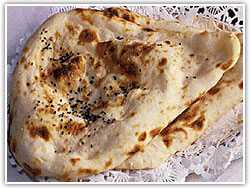 |
|
|
and
delicious. Indians also make paranthas stuffed with
potatoes or other vegetables which are complete meals
and are eaten along with plain yoghurt and pickle. Puris
are made from the same basic dough rolled out thin and
round with a wooden roller and deep-friend in clarified
butter or vegetable fat.
Types of North Indian Cuisine
Indian Food has been rated by most of the cultures as
one of the best food available. Especially for
vegetarians the travel to India is half worth to enjoy
the India food only with its rich varieties. Indian
restaurants have been flourishing in the capitals of the
world and thus, Indian cuisine is no longer a mystery.
In UK, Indian curry is the third most popular dish among
the Britishers. Among the Japanese, the curry rice is
relished quite a lot and it is the second most popular
dish according to a recent survey. UK has more than 1000
Indian restaurants and USA, Canada and Japan have over
100 restaurants each. India attracts over 3 million
foreign visitors every year for an average stay of one
month. The Indian Cuisine is also gaining more
popularity due to the rich taste, exotic flavor and
healthy preparation. Indian cuisine has a very good
taste which is designed not only to satisfy the taste
buds but also the human psychology. The Indian cuisine
is easy to prepare, tasty and can be prepared in less
time. Spices are the main part of the Indian cooking and
their quantity and proportion varies with the
geographical boundaries. Spices are freshly grounded and
added in many different combinations. Some of the spices
which are commonly used are coriander, turmeric, cumin,
chilies, fennel, and fenugreek. Other spices which are
added for some fragrance are cardamom, clove, cinnamon
and star aniseed.
There are various techniques of
Indian cooking. Some of these techniques are Baghar or
Tadka (Instant seasoning or Tempering), Balchao
(Pickling), Bhunao (Curry), Dhuanaar (Smoke Seasoning),
Dum (Steaming), Handi, Kadhai, Talna (Frying), Tandoori
and Tawa. Tandoori cooking is a north Indian specialty
and famous all over the world. Tandoori chicken, Naan,
Tandoori Roti, Tandoori Kebabs are some of the famous
Tandoori dishes.
The Indian cuisine can be divided into two main
cuisines, North Indian and South Indian Cuisine. A
typical North Indian meal consists of Chappatis,
parantha or pooris (unleavened flat breads), dals,
curries that are mild and made in ghee, vegetables
seasoned with yogurt or pomegranate powder, green
vegetables like spinach and green mustard cooked with
paneer, north Indian pickles, fresh tomato, mint,
cilantro chutneys and yogurt raitas. North Indian
desserts and sweets are made of milk, paneer, lentil
flour and wheat flour combined with dried nuts and
garnished with a thin sheet of pure silver. Nimbu Pani
(lemon drink), Lassi (iced buttermilk) are popular
drinks of the North. Hot and sweet cardamom milk is very
common before going to bed. North Indian Cuisine can be
further divided into different categories according to
states and tastes. These categories are Kashmiri,
Punjabi, Rajasthani, Garhwal, Pahari, Uttar Pradesh,
Awadh and Lucknow. |
|
|
|
North Indian Food
Bread is more commonly eaten than rice. The
omnipresent chappati is the common man’s dish. Nan
is kind of a luxury and is preferred eaten with
tandoori food. Another variety of rich bread is
parantha which is prepared of wheat flour and is
relished by almost everyone. Since most of the
Indian restaurants abroad serve Tandoori food, the
foreigners are more familiar with it. Tandoori
chicken or mutton is a barbecued food which is
spiced and marinated in yoghurt. Tandoori
|
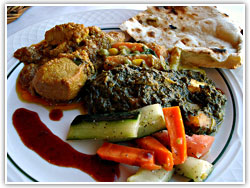 |
|
|
chicken
with a nan, green salad and a dessert is a dish which
the tourists cannot resist. Tandoori food is not very
spicy and is very similar to western cooking. In Delhi,
many varieties of meat kababs are available like the
Boti Kabab, Reshmi Kabab, Pasinda Kabab. The other
delicacies of the Northern Indian cuisine are biryani
which is a dish made of rice, saffron and marinated lamb
or chicken. Pulao is a slightly less complicated version
of biryani. There is another exciting version – sweet
pulao made with rice, coconut, almonds, mangoes and
papayas.
Besides tandoori food, the other
choices available are Rogan Josh, lamb curry, Kofta,
Korma or Do-Piaza. Do Piaza is made with lots of onions,
Korma is particularly rich and Koftas are curry along
with small balls of meat. The large Koftas have a
stuffing of boiled eggs. North Indian meal is also
accompanied with dal (lentil soup). For the vegetarian
lovers, this cuisine offers several dishes like Panner,
Sag Paneer (cheese with spinach), Bharta, a delicious
vegetable made from egg plant and several other dishes
combining cauliflower, potatoes and other similar
vegetables. The dessert mainly includes kheer, firni
(pudding) or halwa. Since Kashmiri food has also been
influenced by Mughlai food, so there are many varieties
of meat dishes especially lamb dishes, and is spicier as
compared to other typical North Indian dishes.
Kashmiri Cuisine
The most famous form of the Kashmiri cuisine is Wazwan.
Wazwan is the traditional 24-course banquet with many
ways of cooking and varieties of meat - some in curry,
some dry, and of various sizes. These are carefully
cooked by the master chef, Vasta Waza, and his retinue
of wazas. The meal is served on a large metal plate
called the trami. The rice is served in a mound in the
center. There is an earthen pot which is filled with
freshly made yogurt and chutney. The meal began with a
ritual washing of hands at a basin called the
tash-t-nari, which is taken around by attendants. Seven
dishes are a must for these occasions which are Rista,
Rogan Josh, Tabak Maaz, Daniwal Korma, Aab Gosht,
Marchwangan Korma and Gushtaba.
Punjabi Cuisine
The most famous dish of Punjab is the Sarson ka saag,
which originated from Punjab. This dish of green mustard
is simmered and slow cooked over coals along with rajma,
kali dal or lentils. This dish is served with unleavened
bread of cornmeal or wheat and a dollop of butter or
with steamed basmati rice. |
|
|
|
Rajasthani
Cuisine
The major ingredient of the Rajasthani or Marwari
dishes is the Gram flour or Besan. The gram flour
is used to make some of the delicacies like Khata,
Gatte Ki Sabzi and Pakodi. Powdered lentils are
used for Mangodi and Papad. Bajra and corn are
used all over the state in the preparation of
Rabdi, Khichdi and Rotis. Some of the famous
sweets and desserts of Rajasthan are Laddoos,
Malpuas, Jalebies, Rasgullas, Mishri Mawa, Mawa
Kachori, Sohan Halwa |
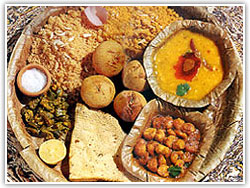 |
|
|
and Mawa or milk cake.
Uttar Pradesh Cuisine
Most families in Uttar Pradesh eat vegetarian food. The
most famous sweets which are found in the cities of
Uttar Pradesh are jalebies, sweetmeats, variety of 'kachoris'
and pethas. The Awadh style of cooking is famous all
over the world for its tender meat dishes and excellent
sweets. Lucknow is known all over the India for its
biryanis and different meat preparations. Nihari and
naan, a mutton dish served for breakfast is one of the
dishes that should be tasted to be believed.
Sweet Dishes (Pakwan)
India is a country of sweets and each region of India
has its own specialties. Most Indian sweets are made by
boiling down milk to remove the moisture. It is called
khoa. When butter, sugar and many other flavours are
added, then these take the form of barfi, malai, kheer,
rasgulla, gulabjamun and sandesh. The various regional
recipes have different forms of rice puddings, milk
puddings, vegetable and fruits dipped in sweet syrup
etc. Combinations of all these offer hundreds of
varieties of sweet dishes. These desserts can be
decorated with raisins, almonds, and pistachio etc.
Paan (Betel nut)
Paan is generally eaten by people after having their
food. Paan is a betel leaf wrapped around a variety of
ingredients. Every paan-seller has his special recipe to
make. There are as numerous styles of preparing paan in
India. The paan made of betel leaf is the most popular
and has some digestive properties. |
|
|
|
Drinks of India
In North India, lassi is the most popular drink.
Sweet or salty buttermilk is freshly prepared in
your presence. The South and the West offer fresh
coconuts as their most refreshing drink. Both
fresh and packed juices of mango, sweet lime,
pineapple and orange etc. are easily available.
Liquor stores are also situated in major cities of
India. Imported whisky and other alcoholic drinks
are a little expensive. Many brands of scotch are
readily available and are not very expensive. But
Government imposes heavy taxes on liquor. Indian
liquors are very reasonably priced and are popular
among foreign residents in India. Indian beer is
of excellent quality and inexpensive. It is now
exported to some European countries especially to
U.K. But its cost goes up quite a lot when you
drink it in a restaurant or any five-star hotel.
Tourists visiting Sikkim should try the local
brands & Liquors etc. are famous |
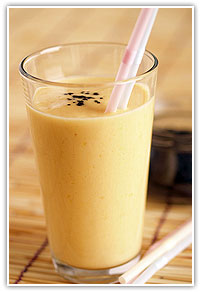 |
|
|
for being cheap thus
having excellent quality.
Indian Tea
India is the largest producer of tea in the world.
Indian tea is known for its taste and flavour and is
quite popular. There are many brands of tea available in
India. The famous Darjeeling and Assam tea is relished
by everyone. It comes in attractive packs. Both cold and
hot coffee are available in all the major restaurants of
the country.
Soft Drinks
Being a tropical country, India offers numerous
varieties of exotic soft drinks like Lassi , Chach, Jal
Gira, Rose water, Difrrent kind of Sharbats as well as
some foreign brands like Pepsi and Coca Cola. India
maintains the same standards as the foreign brands. It
offers many brands namely Thums-up, Limca, and Maaza, a
mango drink. Maaza is also marketed in the USA and the
Middle East and Thums-up is sold in some countries of
the Middle East.
Ice-Creams
India manufactures superior quality dairy products and
chocolates and they do not differ much from the Swiss or
Dutch products. Amul, Nestle and Cadbury are the popular
brands of chocolates and dairy products. Ice-cream is a
speciality in India and are quite readily available.
Excellent ice-creams are sold at street corners by
vendors or any corner shops. Famous brands of ice-creams
are Milkfood, Kwality, Vadilal, Mother's Dairy and
Gaylords, Cream Bells, Amul to name some.
Fast Food
Indigenous chains of fast food outlets have developed
everywhere, which are not very different from their
American counterparts. McDonalds, K.F.C., Pizza Hut,
Wimpy’s, A British fast food giant, have their chains in
India since a very long time. The Nirulas, which is an
Indian chain, has its branches in some countries of the
world.
Western Food
Western and Chinese food is available almost everywhere
in India. There are speciality restaurants for French,
Italian, Chinese or Japanese food in every major town.
Recently, some Thai restaurants have also come up in
Mumbai and Delhi. The tourists can enjoy all varieties
of food in India itself.
For any further more information on the different Indian
cuisines, please contact us and join the special Indian
Cookery courses of North India Tours. |
|